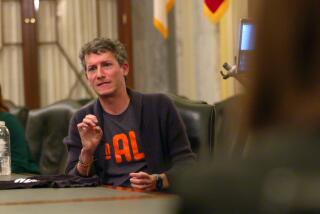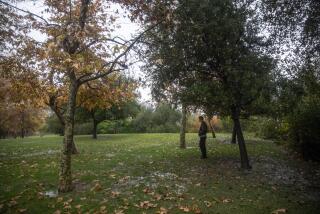Reach Out : Support Gets New Meaning as Son Struggles With AIDS
- Share via
When I was a child, the word support meant “to keep from falling . . . to sustain the weight of . . . .”
There was a physical connotation in the definitions that still brings to mind colorful blocks supporting a teetering column of other colorful blocks. Four decades later, during the early ‘60s, another definition was created: support became a psychological term meaning “empathize, comfort, justify, inspire hope.”
This new interpretation gave birth to a system of human-healing mechanisms. Wherever people were anxious, grieving, lonely, in pain or facing indecision, support groups sprang up.
Today, almost every hospital, social service agency, senior center, church and synagogue hosts a variety of these. Identify the illness or the problem--AIDS, Alzheimer’s, grief, abuse, Parkinson’s, diabetes, divorce, burned-out caregiver--and we find people coming together, reaching out to one another, offering and seeking support for their shared concerns.
The premise of the meetings is “self-help,” assistance without professional intervention but with trained leadership.
A widow, experiencing the pain of change and loneliness, can find comfort, empathy and even the end of depression and self-pity by hearing from those who have also suffered the loss of a spouse and are attempting to restructure their lives. Constant companions of those with debilitating illnesses require time out, an opportunity to their ventilate frustrations.
Grief over a death in the family, the shock of retirement, almost every assault that we suffer as human beings, can be assuaged, clarified, even simplified by the support of others who have experienced or are experiencing comparable pain. Without an opportunity to share our burden, many of us stumble and fall.
When our children were growing up, we parents provided their support. We understood, even anticipated, their needs and met them. Many of us in the “Shades of Gray” generation have needs today. We appreciate the understanding, empathy and support of our children. Such role reversal is neither unusual nor unbecoming.
Such expectations, however, are no longer realistic for some of us; there will be no role reversal. Instead, we are experiencing a regeneration of our parenting role.
Divorce, the economy--with its job losses and house foreclosures--and devastating illnesses have struck stunning blows to some of our children. Their needs for our continuing support have surpassed and far exceed our needs for theirs.
My own family’s experience demonstrates this. Our 43-year-old son has AIDS. The doctors have been candid with him and with us: His life expectancy is now measured in months. We are engulfed in sadness. Parents are not supposed to even contemplate such devastating loss.
Coping with grief that enshrouds us in sadness is not easily accomplished, but it is possible. AIDS has put a new face on our parenting. While it deals devastating, unexpected and indiscriminate blows upon its hosts, the disease itself is engulfed in fear and bigotry, pushed into dark closets by the whispering of confused and fearful people.
As we face our son’s reality and the assault upon our hearts, we are learning about the side effects of AIDS in the family.
Many friends and relatives cannot or will not even say “AIDS,” as if the word itself were contagious. One family member, an ostensibly intelligent woman, asked me if we still kiss our son. I swallowed my anger, explained that we do without hesitation or fear and that the virus itself cannot survive in the air.
Crushed by the reality of our son’s condition, fatigued by our heartbreak, we sought and have found support in a self-help group.
Anger, which accompanies heartbreak, is hard to contain and difficult to express. We cannot be angry with our sick son. The elusive bigot and the unreal fears are tough to corner. A support group, where members listen to each other’s pain and understand, provides an opportunity to express anger, confusion and hurt, and the chance to be comforted.
In a group session, I can comfortably complain about members of our family who seem to lack compassion, and discover that we are truly not alone, others experience the same problem. What might be called gossip on the telephone or maudlin cocktail party chatter is healing conversation in the closed confidential confines of a support group.
But the group is not the only support available. There are good people who care and who deliver kisses without fear. Friends at opposite ends of the country keep in touch and always have time to listen. An 82-year-old aunt who picks up the phone to hear our news and to speak of her love for Jeff and for us brightens the hour and provides us with strength. The flowers that come from one who cannot talk about it are shocking. I want to scream, “He is not dead yet!” then I understand; they too are a gesture of support.
Doing something for Jeff is supportive, too. That fulfills a compelling need because what we really want to do for our son is wipe out AIDS, make it go away like the “boo-boos” of his childhood.
We cannot do that, so we try instead to do what we can to add to his comfort.
Searching for a left-handed pair of scissors (his right side is paralyzed) is a labor of love and--momentarily--a mechanism of healing. When my husband fashioned a special gadget to enable our very independent son to carry his own coffee cup on his cane, he was a man possessed. Doing for Jeff is probably more important for us than for him.
Another parent who attends our support group explained that her need to do for her son was so frustrated by his need for independence that she sought volunteer work for herself at Fraternity House, a North County AIDS hospice. Doing for other people with AIDS helps satisfy her need to “do something” for her son.
The support of friends, family and strangers enables all of us to deal better with our own heartbreak and to reach out to others. When the pain and frustration are aired and shared, we become more capable of coping, better prepared to face tomorrow’s sadness. We learn at the support group that one person’s experience is a supportive block to another.
While isolation encourages the growth of sadness and confusion, sharing provides understanding and love, and it rounds off the sharp edges of pain.
The Self Help Center of the Mental Health Assn. of San Diego County can make referrals to free or low-cost support groups in North County for a variety of target groups. Call 275-0607.
Being Alive, a nonprofit AIDS organization, sponsors groups in North County for people with HIV/AIDS, as well as their families and friends. Call 291-1400.


